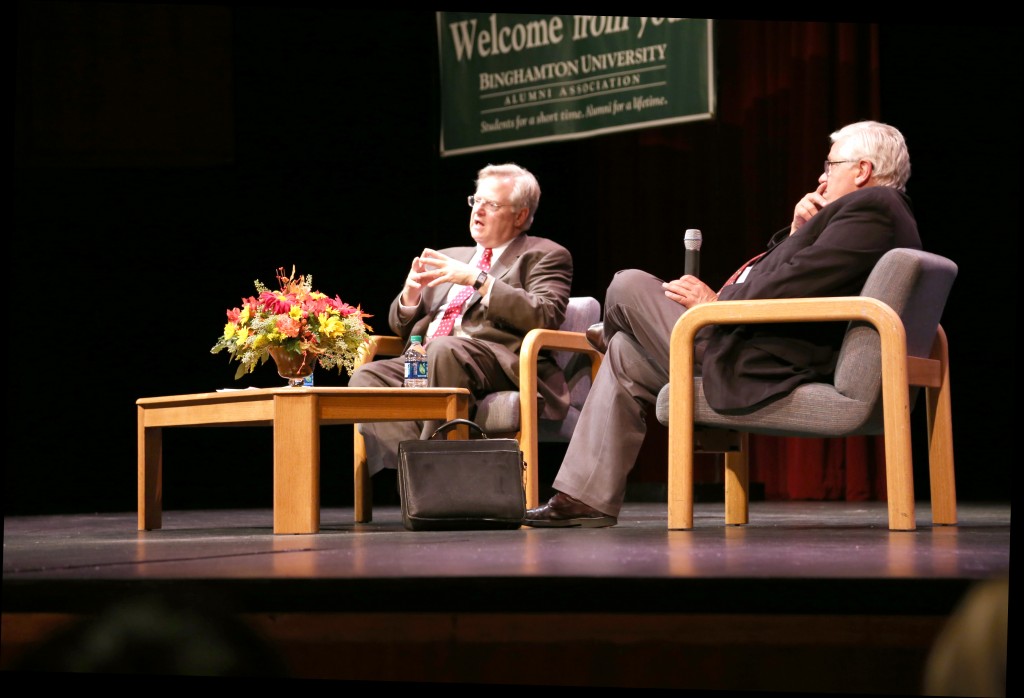
For a speaker used to the White House and United Nations Headquarters, 1979 alumnus Eric Schwartz still appeared at home in Binghamton University’s Watters Theater.
“It’s a joy to be back, I remember sitting on this stage,” Schwartz said. “I remember playing a trombone solo on this stage. I was in jazz band as a student.”
Schwartz, a former assistant secretary of state and special envoy in the U.N., spoke at BU Monday night about the responsibilities of nations to respond to disasters abroad.
The event, titled “Human Rights & International Responsibility to Protect: Promise or Pipe Dream?” was coordinated by Dorm Room Diplomacy and the Alumni Association. It focused on Schwartz’s experience in international affairs from 1989 to 2012.
“I’d like to note the long tradition of development of international law to protect non-combatants,” he said. “But tonight I’d rather focus on international community’s willingness and capacity when this framework breaks down.”
Schwartz explained why countries, especially the United States, decided to intervene in Pacific Islands and Kosovo but not Rwanda or Serbia.
“Srebrenica was an area that was declared safe by the U.N., and shortly after Dutch troops stood by as Serbian soldiers massacred locals. These events inspired soul-searching, as they should,” he said. “In the mid-’90s we then saw intervention in Sierra Leone, Kosovo, East Timor.”
Schwartz argued that while many countries were conflicted about intervention, the instinct to protect civilians was often a positive one.
“Right to protection has been a tool of advocacy, even in cases where the government has become dismal,” he said. “Stronger action as the norm can push other states abusing the rights of citizens.”
Although Schwartz warned that he was not a public expert on Syria, many questions after his lecture were focused on policy implications in Syria.
“What can the West actually do, besides pump money away?” said Jon Mermelstein, a sophomore majoring in history.
Other students were even more skeptical about intervention.
“According to The New York Times, the rebels include extremists, terrorists and even cannibals. Is the U.S. going to support people who do not care whether we help and may stab us in the back?” another student asked. “How can the U.S. convince its citizens that leadership is more important than life?”
Questions lasted until the moderator, political science professor David Cingranelli, ended the event.
Students said they enjoyed Schwartz’s visit.
“He had a very interesting perspective on U.S. policy and leadership,” said Dorothy Manevich, president of Dorm Room Diplomacy and a senior majoring in history. “Personally, I think that discussion on U.S. leadership and U.S. power seems to be waning every month. He sees it as still important, in contrast to many senior White House officials.”
Colleen Farrar, a junior majoring in political science, said she was impressed that Binghamton could attract such high-ranking political officials.
“It’s amazing that we can have a speaker of such importance,” she said. “He was very friendly and open to questions. I just wish more people came.”
After the event Ben Sheridan, event organizer and a senior majoring in political science, argued that only about 60 attendees filling a theater with a capacity of 558 was a mixed indicator for the student body.
“Conversation was lively. We had a good event but attendance was an issue. We’re bringing phenomenal speakers. We hope it’s not about students being apathetic,” he said. “Events like this are supposed to begin conversation, and we won’t know how it goes through until we see these conversations develop.”


